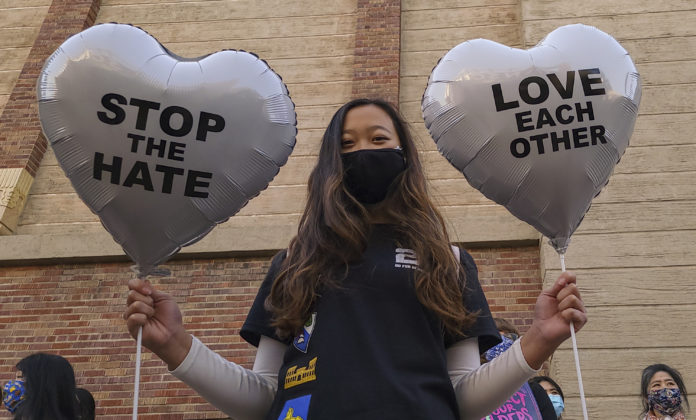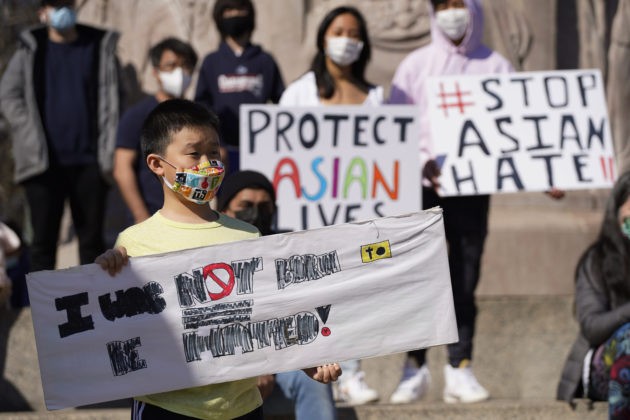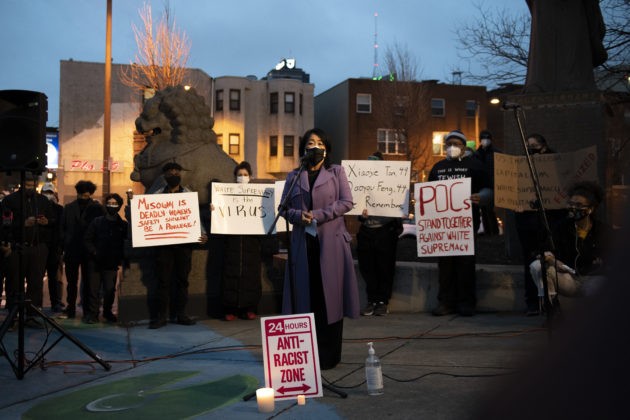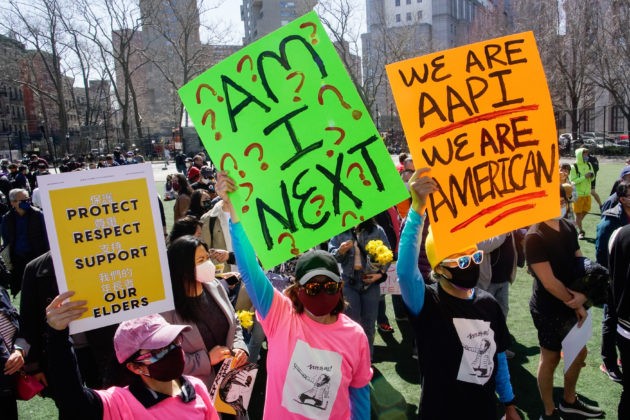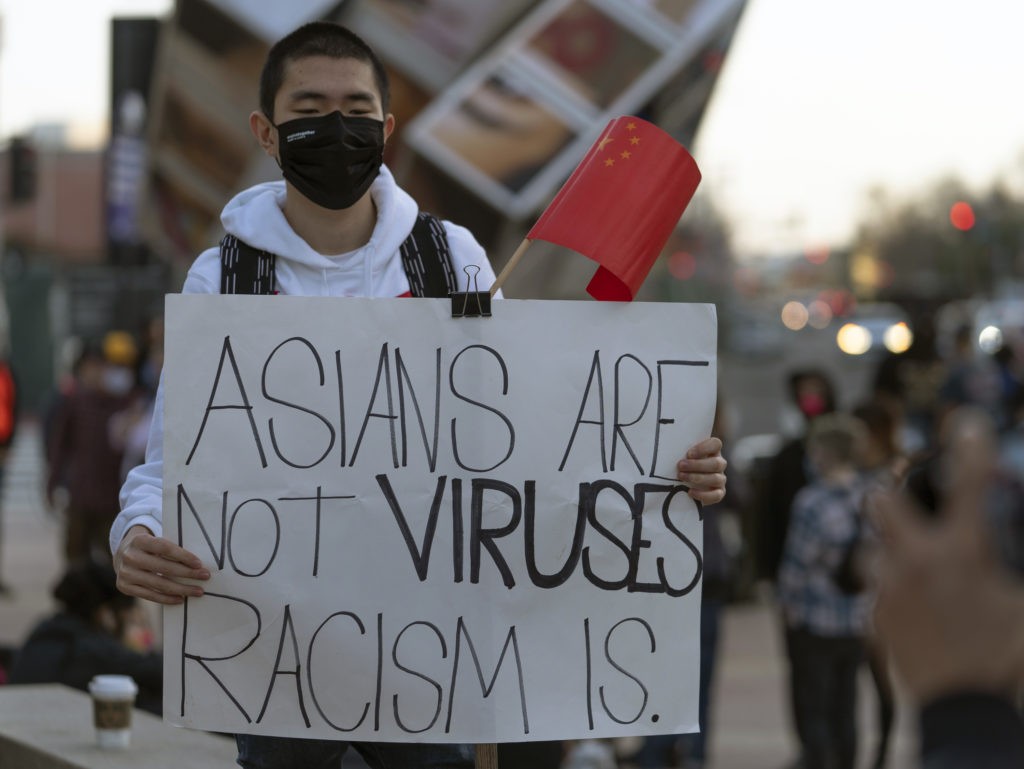
BYU alumna Stella Lew was running with her husband down Bulldog Boulevard in Provo in May 2020 when a white man driving past rolled down his window and yelled “F— you!”
No one else was on the street in front or behind them and both Lew and her husband had masks on. Lew was sure the statement was meant for them and that it wasn’t related to mask non-compliance.
“I can only come up with one reason — that it was because we’re both Asian,” Lew said. “I was mostly in shock at first. But more than anything, I was scared and was worried about our safety.”
A rise in violence or a history of hate?
Anti-Asian rhetoric, sentiment and violence appear to have escalated during the COVID-19 pandemic, with people of Asian or Pacific Island descent experiencing everything from verbal and physical assault to discrimination in the workplace, at businesses and on transportation.
Stop AAPI Hate — a non-profit that tracks and responds to incidents of discrimination, hate and xenophobia against Asian Americans and Pacific Islanders in the United States — received 3,292 reports of incidents that occurred in 2020 and 503 that occurred in 2021. Four of those events took place in Utah.
Verbal harassment incidents made up the majority of reports at 68%, followed by shunning and avoidance at 20% and physical assault at 11%.
The violence has gained national media attention, particularly in places with large Asian populations like New York City and San Francisco, which have seen numerous attacks on Asians, especially older people.
The tragic killing of eight individuals — six of them Asian women — during a shooting in Atlanta on March 16 has acted as an additional springboard for calls of social justice, with protests to end anti-Asian hate spreading across the U.S. — including one planned for April 3 in Salt Lake City.
Although police have reported that the shooting was not racially motivated, many advocates argue the violence was linked to a history of sexualization and racialization of Asian women in the U.S.
Emilio Manuel Camu, the president of OCA Asian Pacific Islander American Advocates Utah, said although there’s been increased attention on and media coverage of anti-Asian hate during the pandemic, it’s a problem deeply embedded in American history — one that’s obscured by model minority stereotypes about Asians that erase current and past discrimination and struggles.
“People think Asians are doing well and that Asians have never been discriminated against — they forget the Chinese Exclusion Act of 1868, they forget Japanese internment, they forget the Watsonville Riots in California against Filipinos. They forget all of these different things that Asians have experienced,” Camu said. “A lot of these sentiments against Asians, sentiments against other folks, tend to be a repeat of history.”
That doesn’t mean current discrimination isn’t difficult to deal with, especially on top of a pandemic.
“Our community members have they felt microaggressions before, but for this to all come out during a pandemic and to not be able to walk into a place to be able to secure the basic necessities they need for their family to cook dinner, to provide water — I think it’s a pretty sad time to live in if that’s the case,” Camu said.
Barriers to reporting Anti-Asian incidents in Utah
Although Utah recorded 836 violent crimes against people of Asian or Pacific Islander heritage last year, none of them are considered hate crimes, House Minority Whip Rep. Karen Kwan told KSL.
“Zero of these are considered hate crimes, which underscores how inconsistent and underreported hate crimes are,” said Kwan, who is the state’s first Chinese-American and is urging Utah’s Asian Americans to report any racially motivated attacks or harassment.
Likewise, BYU’s Committee on Race, Equity, and Belonging has not received any reports of anti-Asian racism on campus, according to BYU Committee for Diversity Collaboration, and Inclusion Manager Lita Little Giddins.
Ze Min Xiao is the director for the Salt Lake County Mayor’s Office for New Americans. She said in order to understand how the national trend in rising anti-Asian sentiments impacts Utah and why the state’s seen zero official hate crimes, it’s vital to first understand the realities the community faces.
Although Asians are the fastest-growing minority group in Utah, they still only make up 2.7% of the state’s population, according to Census data, and there are few systems in place to support Asian Utahns, especially those who live outside of Salt Lake City.
“Part of the reason we haven’t seen reported cases of anti-Asian sentiment in Utah could be contributed to that we don’t have a mechanism in place for people to report,” Min Xiao said.
Camu, the OCA Utah president, has seen infrastructure supporting Utah’s Asian communities grow in the decades since he moved to Utah from the Philippines as a child. “It really has come from a push from the community to be seen and to be heard … but there’s only so many of us.”
He said OCA and others are working on removing some of the barriers that prevent Asians from reporting, including social stigma, a lack of resources in languages other than English, a lack of trust in the police, and socio-economic situations that make finding the time to report difficult.
“These people, most of them are low-income people in our communities who have to go to work the next day, who have to take care of kids, who have to take care of extended family members,” Camu said. “And at the end of the day, they are overwhelmed with all the different things that they have to do that then reporting doesn’t become the priority.”
He added that any improvements in infrastructure should take into account the various communities that fall under the Asian umbrella and the specific issues they face.
While Min Xiao believes her office, which only has jurisdiction in Salt Lake County, is making headway with some of these issues, she said there’s a need to think “wider and broader beyond Salt Lake County” if the state wants to keep up with the trend of more Asians moving outside the county for housing and jobs.
“There’s a role for the state to really be intentional and think through how do we support infrastructures, how do we support community-based organizations to help their capacity so that they are able to address the needs and the increasing demands that a more diverse community will need moving forward,” Min Xiao said.
In the meantime, Min Xiao said individuals can take advantage of the local resources that do exist and work to build those support systems in their own communities.

The reality of being Asian in Utah
Both Camu and Min Xiao said they’ve heard reports of racist sentiments against Asians in Utah during the COVID-19 pandemic.
“As aware as our community was of who they are and of being Asian in a predominantly non-Asian state, I think they became hyper-aware and more anxious about the ongoing political timing and trying to fit in but also trying to keep their identities intact,” Camu said.
Lew, the woman who was verbally harassed while running, said she has felt “super aware” anytime she is in public. “Who knew what could happen? People had been getting attacked in public areas like in New York in San Francisco.”
BYU student Hyrum Chen didn’t have to go out in public to experience anti-Asian sentiments; it happened to him in a Zoom class.
Chen recalled talking about the Schrodinger thought experiment in class and commenting in the class Zoom chat about cats, as they were involved in the experiment. He then received a direct message from a student that he had never met making a ‘joke’ about Asians eating cats. “Cat’s are delicious,” the comment said.
“It seemed like he was making the comment to poke fun at my last name Chen and my Chinese ethnicity,” he said. “It may seem like a small joke, but to think that these racist phrases are still present in a ‘woke’ society still doesn’t seem accurate when awareness is only for specific races and excludes others.”
Nathan Kou, another BYU student, has also felt targeted because of his race. Last year, Kou was with his family at Heber Valley Railroad when he said a white man ahead of him in line kept on staring at him and his family while shaking his head in anger or disgust and whispering to the woman with him.
“At first, I was shocked, then came anger and frustration towards this man I had just met, especially how he was treating my family, giving us a disappointed look, like we are the cause of the virus, based off our race,” Kou said.
Hallie Turner, a BYU Korean-American freshman, said she’s never experienced a hate crime. Instead, she said the incidents she’s experienced have been “kind of unspoken.”
“Although no one has been malicious or said something really hurtful to me, it’s hard being Asian, and especially being at BYU when there’s not a very large Asian population,” Turner said.
She described the discomfort she feels because of the “attention that we receive for looking different” as well as the difficulties of living in an area where the beauty standard is “blond hair and blue eyes.”
“People are like fascinated by different-looking people because they’re not used to it —but it just makes us feel even more like even more of an outsider than we should feel,” she said. “My advice, though, is maybe try to look at people how Christ sees them. Heavenly Father created all of us and we all look different, but He loves us all equally.”
Kristine Kim contributed to this report.


